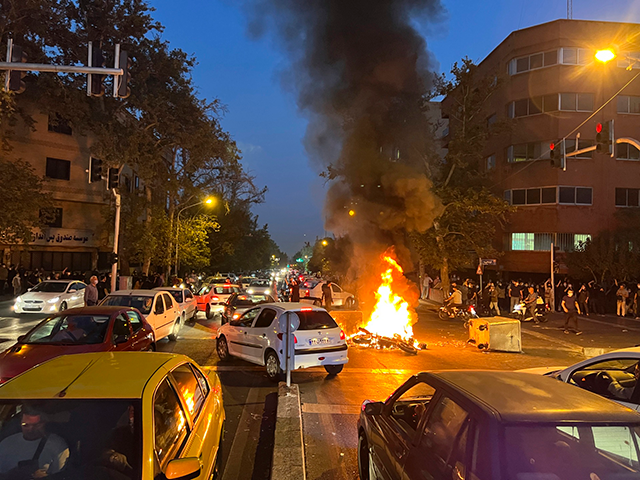Iran Human Rights (IHR), a monitoring group based in Oslo, Norway, said on Monday the death toll in Iran’s hijab protests is now over 75 — far higher than the Iranian government’s official count of 41.
A video posted on Monday by London-based opposition group Iran International showed Iranian security forces savagely beating a young female protester.
IHR said video footage and death certificates show “live ammunition is being directly fired at protesters.” The group also said riot police are beating protesters with clubs and using water cannons on them, while protesters have thrown rocks and set police cars on fire.
In the video uploaded by Iran International, a young woman removes her headscarf and walks toward the police with her arms open, only to be immediately thrown to the ground and clubbed:
This video, obtained by @IranIntl, shows an Iranian girl who has removed her hijab and opens her arms to the security forces, but is brutally beaten.#IranProtests2022#Mahsa_Amini#MahsaAmini#مهسا_امینی pic.twitter.com/UPW8Xnh6ga
— Iran International English (@IranIntl_En) September 26, 2022
Another video posted by the group showed an old man getting beaten down for protesting on Sunday night:
This video shows the Islamic Republic’s security forces brutally beating an old man in Tehran’s Ekbatan Town on Sunday night. The beating, however, does not keep him from expressing his protest. #IranProtests#IranProtests2022#MahsaAmini#Mahsa_Amini#مهسا_امینی pic.twitter.com/jYLxHKGAR0
— Iran International English (@IranIntl_En) September 26, 2022
Kurdish women in Syria showed their support for the protests, and for the young Iranian Kurdish woman named Mahsa Amini whose death at the hands of Iranian “morality police” launched the uprising, by cutting their hair and burning their headscarves:
Kurdish women in Northern Syria cut their hair and burn their headscarves in solidarity with the women of Iran and in protest of the murder of their Kurdish sister Mahsa Zhina Amini.#MahsaAmini #ZhinaAmini pic.twitter.com/aKJ21gbCns
— Yashar Ali 🐘 یاشار (@yashar) September 27, 2022
Iran International reported on Tuesday the regime is dealing harshly with the growing number of Iranian celebrities who have expressed support for the protest movement:
“Get this into your heads, you murderers! We have lived on this land for thousands of years and seen what happened to Mongols [invaders]. We will stand on your graves, too! You can’t silence us!” Mohammad Khodabandehlou, a footballer with Sirjan Golgohar FC wrote on Instagram.
The local prosecutor’s office Monday impounded the luxury villa of soccer legend Ali Karimi, in Lavasan, a resort area only kilometers from Tehran, for his candid and continued display of solidarity with the protests immediately after they began.
Photos of the villa’s entrance were published on social media with signs saying the property had been sealed by judicial order “until further notice” but these were removed later without any explanation.
“A home without a land is worthless,” Karimi said in response to reports that the regime had seized his house.
“I’m an Iranian woman who for years because of enforcement and fear, wore a headscarf, but it was never my choice and it no longer will be,” declared Shiva Ebrahimi, one of a half-dozen prominent Iranian actresses to join the movement.
All of the actresses who spoke up were accused of “breaking the law” by Minister for Culture and Islamic Guidance Mohammad-Mehdi Esmaili, and invited to “freely start new jobs elsewhere.”
Two-time Academy Award-winning director Asghar Farhadi supported the movement in an Instagram video on Saturday in which he said Iranian women are “looking for simple but fundamental rights that the state has denied them for years.”
The Times of Israel (TOI) noted a political conflict brewing as reformers called for relaxing women’s dress laws and disbanding the enforcers that killed Amini, while the regime digs in its heels and insists the entire protest movement is the work of foreign saboteurs:
The main reformist group inside Iran, the Union of Islamic Iran People’s Party, has called for repealing the mandatory dress code and winding down the morality police.
The party — led by former aides to ex-Iranian president Mohammad Khatami, who oversaw a 1997-2005 thaw with the West — also called on the government to “authorize peaceful demonstrations” and release those arrested.
Protests abroad have been held in solidarity with Iranian women in Athens, Berlin, Brussels, Istanbul, Madrid, New York, Paris, Santiago, Stockholm, The Hague, Toronto and Washington, among other cities. Meanwhile, Iran has organized large rallies in Tehran in order to display support for the dress code and the country’s conservative values.
The theocracy-controlled Islamic Revolutionary Guard Corps (IRGC), a designated terrorist organization, launched waves of drone and artillery strikes against Kurdish separatist groups in northern Iraq on Saturday and Monday.
The IRGC claimed the separatists were supporting the hijab uprising in a bid to bring down the Iranian government, and accused the Kurds in Iraq of plotting to smuggle weapons to the demonstrators.
Atta Nasir, speaking for an exiled Kurdish opposition party, said his group does indeed support the protests “and will continue supporting them in every possible way,” but said his party has not participated in them. Nasir said the IRGC strikes were largely theatrical and had not caused significant damage.

COMMENTS
Please let us know if you're having issues with commenting.